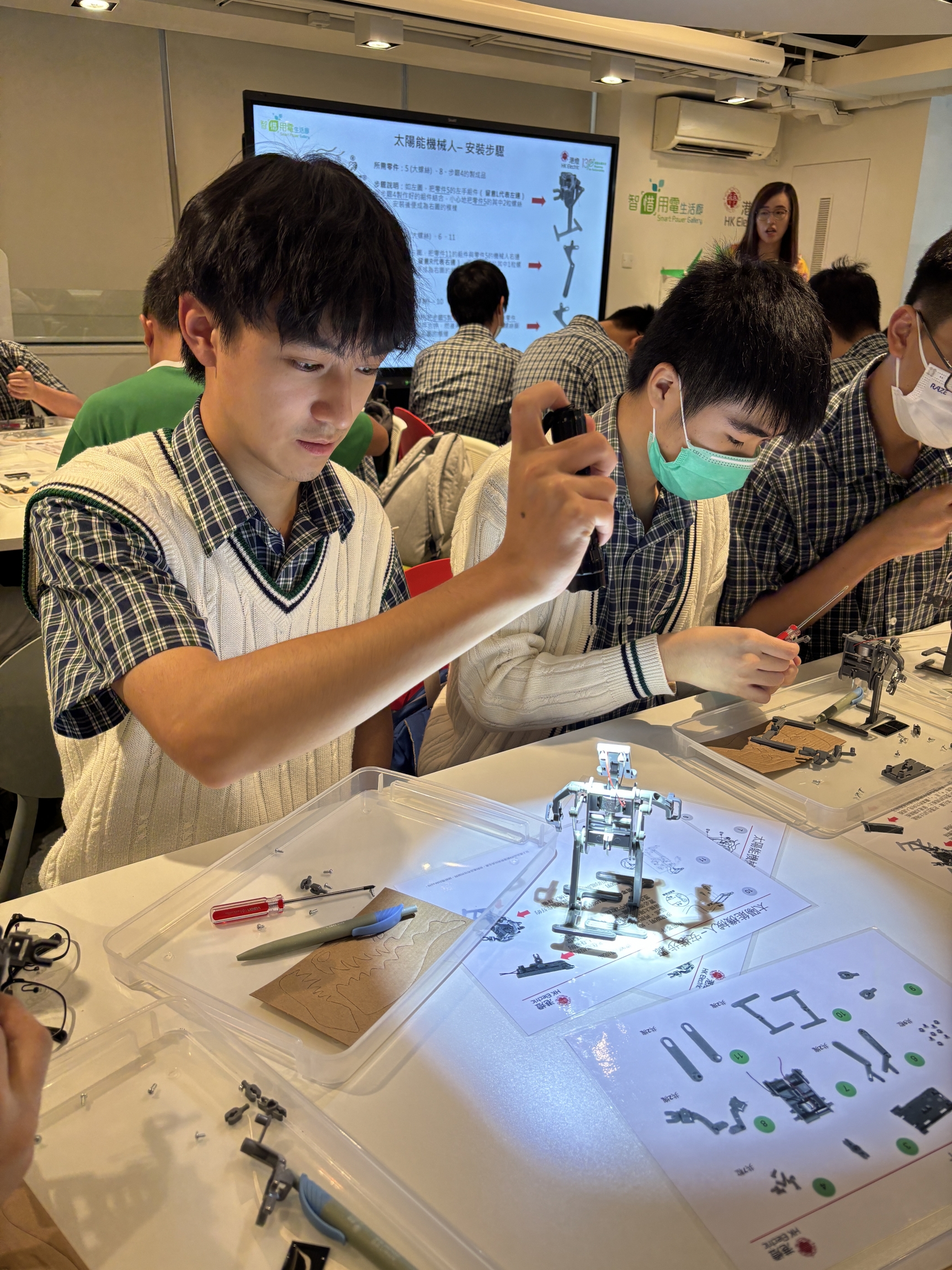COURSE OBJECTIVES
The mission of the department is to educate students by providing them with fruitful learning about science. This is accomplished by a commitment to the highest possible standards of quality in the areas of teaching, assessment and learning. Our goal is to ensure our curriculum is designed to foster the acquisition of foundation knowledge in different disciplines and the development of independent and critical thinking. It will enable students to understand their own potential and responsibilities, communicate their knowledge effectively to others, and conduct themselves in a constructive, ethical and professional manner.
Yearly Departmental Major Concern 2024-2025
- Unleashing students' potential and enhance their interest and engagement in science and innovation
CURRICULUM
Integrated Science
Course Objectives
The broad aims of this curriculum are that students should
- acquire fundamental scientific knowledge and concepts essential for living in and contributing to a scientific and technological world;
- develop inquiry and problem-solving skills;
- become familiar with the language of science and possess the ability to communicate ideas effectively in science-related contexts;
- foster curiosity and interest in science;
- integrate and apply knowledge and skills in science, mathematics, and technology, while understanding basic concepts of engineering design;
- comprehend the practical applications of science and Innovation & Technology (I&T) in daily life;
- recognize the utility and limitations of science, understand the interplay between science, technology, and society, and cultivate a sense of responsible citizenship, including respect for the environment and commitment to prudent resource management; and
- appreciate and comprehend the evolutionary nature of scientific knowledge.
Curriculum S1 - S2
Secondary 1
- Introducing Science
- Water
- Looking at Living Things
- Cells, Human Reproduction and Heredity
- Energy
- Matter as Particles
Necessary Practical Skills
- Using a dropper to transfer solution
- Mixing solution in a test tube
- Using a Bunsen burner
- Using a thermometer
- Reading the scale of a ruler
- Taking a reading from a measuring cylinder
- Using a stopwatch
- Measuring the volume of objects with irregular shapes by displacement method
- Using a microscope
- Preparing slides of animal and plant cells
Secondary 2
- Living Things and Air
- Making Use of Electricity
- Common Acids and Alkalis
- Sensing the Environment
- Force and Motion
Necessary Practical Skills
- Performing the burning-splint/glowing splint test
- Collecting gas using underwater method
- Performing the test with hydrogencarbonate indicator/ limewater
- Carrying out the cobalt chloride paper test
- Performing the iodine test
- Heating by using a water bath
- Connecting a simple circuit
- Using an ammeter
- Using a voltmeter
- Using a rheostat
- Distinguishing series and parallel circuits
- Testing acids and alkalis with litmus paper
- Measuring pH values of common acids and alkalis with pH paper
- Performing 'pop' sound test
- Using a scalpel
Physics
Course Objectives
The broad aims of this DSE curriculum are to enable students to:
- develop interest in the physical world and maintain a sense of wonder and curiosity about it;
- construct and apply knowledge of physics, and appreciate the relationship between physical science and other disciplines;
- appreciate and understand the nature of science in physics-related contexts;
- develop skills for making scientific inquiries;
- develop the ability to think scientifically, critically and creatively, and to solve problems
- individually or collaboratively in physics-related contexts;
- understand the language of science and communicate ideas and views on physics-related issues;
- make informed decisions and judgments on physics-related issues; and
- be aware of the social, ethical, economic, environmental and technological implications of physics, and develop an attitude of responsible citizenship.
Curriculum S3 - S6
Secondary 3
- Introducing Physics
- Reflection of Light
- Refraction of Light
- Lenses
- Electromagnetic Spectrum
- Further Discussions about Light
Secondary 4-6
Compulsory Part:
- Heat and Gases
- Force and Motion
- Wave Motion
- Electricity and Magnetism
- Radioactivity and Nuclear Energy
Elective Part:
- Atomic World
- Energy and Use of Energy
Chemistry
Course Objectives
The broad aims of this DSE curriculum are to enable students to:
- develop interest and maintain a sense of wonder and curiosity about chemistry;
- construct and apply knowledge of chemistry, and appreciate the relationship between chemistry and other disciplines;
- appreciate and understand the evolutionary nature of science;
- develop skills for making scientific inquiries;
- develop the ability to think scientifically, critically and creatively, and solve problems individually and collaboratively in chemistry-related contexts;
- discuss science-related issues using the language of chemistry;
- make informed decisions and judgements on chemistry-related issues;
- develop open-mindedness, objectivity and pro-activeness;
- show appropriate awareness of working safely; and
- understand and evaluate the social, ethical, economic, environmental and technological implications of chemistry, and develop an attitude of responsible citizenship.
Curriculum S3 - S6
Secondary 3
- Introducing Chemistry
- Planet Earth
- The Microscopic World I
- Metals
Secondary 4-6
Compulsory Part:
- Planet Earth
- Microscopic World I
- Metals
- Acids and Bases
- Fossil Fuels and Carbon Compounds
- Microscopic World II
- Redox Reactions, Chemical Cells and Electrolysis
- Chemical Reactions and Energy
- Rate of Reaction
- Chemical Equilibrium
- Chemistry of Carbon Compounds
- Patterns in the Chemical World
Elective Part:
- Industrial Chemistry
- Analytical Chemistry
Biology
Course Objectives
The broad aims of this DSE curriculum are to enable students to:
- develop and maintain an interest in biology, a sense of wonder and curiosity about the living world, and a respect for all living things and the environment;
- construct and apply knowledge of biology, understand the nature of science in biology-related contexts, and appreciate the relationships between biological science and other disciplines;
- develop the ability to make scientific inquiries; think scientifically, critically and creatively; and solve biology-related problems individually and collaboratively;
- understand the language of science and communicate ideas and views on biology related issues;
- be aware of the social, ethical, economic, environmental and technological implications of biology, and be able to make informed decisions and judgments on biology-related issues; and
- develop an attitude of responsible citizenship, and a commitment to promote personal and community health.
Curriculum S3 - S6
Secondary 3
- Introducing Biology
- Food and humans
- Nutrition in humans
- Enzyme and metabolism
- Health and diseases
Secondary 4-6
Compulsory Part:
- Cells and Molecules of Life
- Genetics and Evolution
- Organization and Environment
- Health & Diseases
Elective Part:
- Human Physiology: Regulation and Control
- Applied Ecology
School-based Curriculum:
S1 – S1Minds+ (STEAM)
S2 – STEAM
Course Objectives
The broad aims of this school based curriculum are that students should
- integrate and apply knowledge and skills across disciplines to solve authentic problems through STEAM-related learning activities;
- develop their creativity, collaboration and problem solving skills while their potential in innovation is unleashed; and
- enhance their interest in Science, Technology and Mathematics.
ASSESSMENT
Two major modes of assessment, continuous assessment and end of term examinations, are used to measure student performance. Continuous assessment includes uniform tests, quizzes and tests, laboratory activities, homework and projects.
YEARLY FUNCTIONS AND ACTIVITIES
Robofest 2024 – Robot Sumo Exhibition Tournament: Champion

Robofest 2024 – Bottle Sumo Competition: 2nd Runner-up, Gold Award Silver & Silver Award

VTC Smart City & STEAM Challenge Cup 2024: 2nd Runner Up

HKUST-ExxonMobil iSTEAM Program 2023 – Spider Robot STEAM Challenge: Gold Award

Soybean Project (collaboration with the Soyvestors Co. Limited & CUHK)

Inter-house Invention Competition: Multi-functional School Bag


Extended Learning Activity (Biology) — Mai Po Nature Reserve About Mangrove Ecology

Extended Learning Activity (Chemistry) — Hong Kong Electric Smart Power Gallery + STEM Workshop


Extended Learning Activity (Physics) — Visit to Daya Bay Nuclear Power Station

Science Afternoon – Driving Science for a Better Planet
Inter-class Mini 4WD Car Competition


STEAM Showcase

STEAM Lesson at InnoStation

DEPARTMENT MEMBERS
|
Teacher |
Subject & Level |
Other Responsibilities |
|
Ms Agnes Kwok |
S1 IS, S2 STEAM, S5 & S6 Chemistry |
Head of Department |
|
Ms Cindy Chan |
S1 & S2 STEAM, S2 IS, S6 Chemistry |
S2 IS Form Coordinator |
|
Dr. Jason Chen |
S3, S5 & S6 Physics |
|
|
Mr. Daniel Chung |
S2 IS, S3, S4 & S5 Chemistry |
|
|
Mr. Oscar Lai |
S1 IS, S3 & S4 Chemistry |
|
|
Ms Tracy Liu |
S1 & S2 STEAM |
|
|
Mr. Pon Lo |
S2 IS, S3, S4 & S6 Biology |
|
|
Mr. Ronnie Tam |
S2 IS, S3, S4 & S5 Biology |
Coordinator of Biology |
|
Mr. Francis Tsung |
S3, S4 & S6 Physics |
|
|
Mr. Sam Zheng |
S1 IS, S3, S5 & S6 Biology |
S1 IS Form Coordinator |
|
Ms Charmaine Chan |
S1 IS, S1 & S2 STEAM |
Science/STEAM Associate Teacher |
|
Ms. Carmen Tong |
|
Laboratory Technician (Chemistry & Physics) |
|
Mr. Fernando Mok |
|
Laboratory Technician (Biology & IS) |









